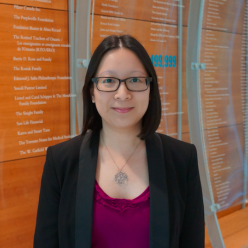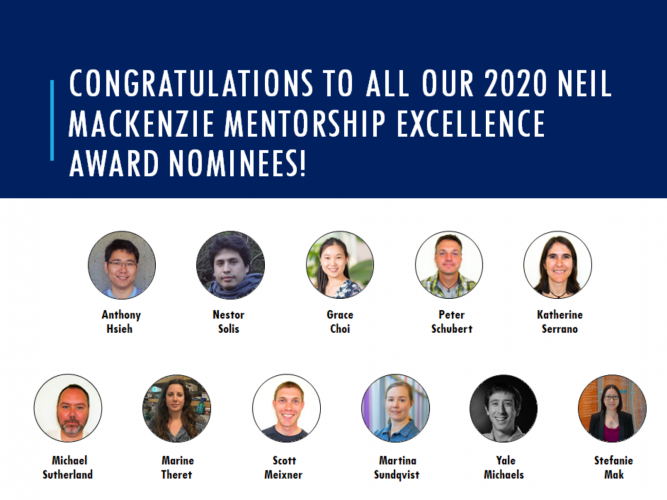
Dr. Stefanie Mak, CBR’s Education Program Manager and the awardee of the 2020 Neil Mackenzie Mentorship Award
Mentorship is an integral part of the scientific journey and a valued practice in the Centre for Blood Research (CBR) community. As a way to champion this, the Neil Mackenzie Mentorship Award is given annually to a CBR member who has demonstrated significant contributions and excellence in mentorship. The award itself honours the memory of Dr. Neil Mackenzie, a postdoctoral fellow formerly in Dr. Dieter Brömme’s lab and an exemplary mentor himself, who inspired others with his enthusiasm, kindness and encouragement.
This year, we received numerous nominations celebrating 11 different mentors for their ability to inspire and empower others within the CBR community. The winner was announced on our Research Day 2020 on August 13th. Congratulations to Dr. Stefanie Mak, the CBR’s Education Program Manager!
As the CBR’s Education Program Manager, Stefanie handles a wide breadth of work, from developing the CBR’s educational programs to facilitating impactful events to spearheading opportunities for trainee professional development.
We chatted with Stefanie about her experiences in mentorship, the importance of being a mentor, and important qualities that mentors can carry forward into their work.
How did you feel when you received the award? What thoughts were running through your head?
I was managing the CBR Research Day logistics and making sure there weren’t any IT issues when I heard my name announced, so I was definitely taken by surprise! I’m very honoured to have received the award.
What got you interested in mentorship? Why do you think it is important?
I think mentorship is an important part of an individual’s professional development, and for me, having great mentors has certainly helped shape my career. I enjoy sharing my knowledge and expertise with others, and I want to pay it forward to help others succeed. It’s very rewarding to see the mentee develop, feel empowered, grow, and thrive under your mentorship.
Is there anyone that you would consider as your mentor? If so, how have they influenced you?
I’ve been mentored by a lot of people throughout my career, so there’s too many to name here! My mentors are valuable sources of advice, feedback, encouragement, and inspiration. They’ve helped guide me through many career challenges, such as choosing a graduate school, managing impostor syndrome, navigating workplace dynamics, having difficult conversations, and hunting for jobs. They’ve also created a supportive environment that allowed me to develop and grow as a scientist and person.
I also learned how to be a mentor from my mentors, and I’ve taken bits and pieces of their mentorship styles and incorporated it into my own style.
What qualities do you think are important for anyone in a mentor position?
1. Good communication skills
As a mentor, you have to be able communicate clearly and effectively to your mentee so that everyone is on the same page, and to avoid any communications gaps that can lead to misunderstandings. I’m always trying to get better at asking powerful and clarifying questions, since they can help the mentee unpack their thinking, and potentially lead to new breakthroughs (aka the “light bulb” moment)!
Being an active listener and being able to recognize non-verbal cues (such as body language and facial expressions) are also helpful in being a good communicator.
2. Patience
Mastery of a skillset takes time to achieve, and your mentee will fail or make mistakes at some point. As a mentor, you have to be patient with your mentee’s progress and not get too frustrated when things are going slower than you’d expect.
3. Empathy
Being empathetic is very important as a mentor in order to build rapport and trust with your mentee. This is especially important during these uncertain times when many people may be going through various personal and professional struggles. As a scientist who’s inclined to solve problems and troubleshoot, I’ve learned to take a step back and give mentees a safe space to express whatever is on their mind. I take care to acknowledge and understand their feelings, share any related stories that I may have experienced, and see if there’s anything I can do to support them.
What is your favourite wild-type (as in non-academic) activity?
Being creative helps me destress after a long day’s work, and I like to do arts and crafts. During the pandemic, I’ve been painting watercolours, crocheting, and making greeting cards. One of my goals is to start a business and sell my creations!

Nominees for the 2020 Neil Mackenzie Mentorship Excellence Award: Anthony Hsieh, Nestor Solis, Grace Choi, Peter Schubert, Katherine Serrano, Michael Sutherland, Marine Theret, Scott Meixner, Martina Sundqvist, Yale Michaels & Stefanie Mak
Congratulations to Stefanie and all our award nominees! We are extremely fortunate to have such great, empowering mentors in our community who are willing to share their insights and experiences with their CBR peers. Whether inside or outside of the lab, you are truly making a difference and touching the lives of others with your mentorship and work, every day.
A heartfelt thank you, too, to all the nominators. We greatly appreciate the time, effort and thoughtfulness you each took to write nominations for your mentors.
Dr. Neil Mackenzie was a postdoctoral fellow in Dr. Brömme’s lab at the CBR. Neil was a dedicated and caring mentor whose encouraging and motivating words and actions were sincerely appreciated by all those whom he touched – colleagues, friends, and students. To honour his legacy and the impact he has made on the people within and outside the Centre for Blood Research, you can make a donation to the Neil Mackenzie in Memoriam Fund. Your donation will support the CBR mentorship initiatives, promoting mentorship excellence throughout our research community.


